-
The next step, by faith
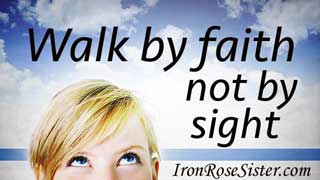 At times, all one can do is take the right next step, do the next right thing.
At times, all one can do is take the right next step, do the next right thing.
We are tired or overwhelmed. Life is crashing in around us and the light at the end of the tunnel is barely a hope.
In those moments, we are truly walking by faith, not by sight.What can we do when we find ourselves in this kind of situation?
• Remember that faith as small as a mustard seed can move mountains (Matt. 17:20).
• Remember that God is working in ways that we cannot see.
2 Kings 6:15-17
When the servant of the man of God got up and went out early the next morning, an army with horses and chariots had surrounded the city. “Oh no, my lord! What shall we do?” the servant asked.
“Don’t be afraid,” the prophet answered. “Those who are with us are more than those who are with them.”
And Elisha prayed, “Open his eyes, Lord, so that he may see.” Then the Lord opened the servant’s eyes, and he looked and saw the hills full of horses and chariots of fire all around Elisha.
We don’t know if Elisha could see with his physical eyes that the army of the Lord surrounded them. But we do know that he looked with eyes of faith.
Having trouble seeing with eyes of faith?
• Finally, remember that we can echo the prayer of the father in Mark 9:23-24.
“‘If you can’?” said Jesus. “Everything is possible for one who believes.”
Immediately the boy’s father exclaimed, “I do believe; help me overcome my unbelief!”
Take the right next step. And that may be to ask that God help you see with eyes of faith so that you can walk by faith, and not by sight. -
The Value of Each Moment in Faith and Redemption
 Written by Eliuth Araque de Valencia, volunteer with Iron Rose Sister Ministries in Colombia
Written by Eliuth Araque de Valencia, volunteer with Iron Rose Sister Ministries in Colombia“And by faith even Sarah, who was past childbearing age, was enabled to bear children because she considered him faithful who had made the promise.” (Heb. 11:11)
I can assure you that both you and I have passed through a variety of seasons in our walk of faith. In particular, I have experienced seasons of fruitfulness and I have also experienced seasons of suffering where I did not understand how God could redeem it. And yet, He did.
In my family devotional life, each night we pray for our deepest needs; it is one of the most anticipated moments, opening our hearts, recognizing that we have our struggles. Each one participates giving their requests… that is the dynamic. My turn comes. I once again made a recurring and embarrassing request for a woman who longs to receive the praise of her husband and children, and at the end of a day with a hectic and busy schedule I said: “I ask that God work in my life as the woman He wants me to be, with a soft and quiet spirit pleasing in His eyes.” My son replied and said: "You have been asking for the same thing for a long time." And this was my starting point of affliction, of pain and anguish. "Yes son, it's time."
It is not that God does not always answer my prayers exactly the way I want Him to, nor how many times I manifest them, it was time to not stand there waiting for something magical to happen, but to trigger change and truly take advantage of every opportunity as a mother, wife, daughter and sister to show Christ, even when His very nature is to redeem.
And this is what I see today in this passage. Here Sarah, wife of the great patriarch Abraham, tends to be seen in a frame of dignity and honor. But reading the biblical description of her life, it is impossible not to notice that at times she acted very badly. She may throw fits and tantrums, be impatient, moody, scheming, fierce, mean, fickle, bad-tempered, jealous, erratic, irrational, a winner, complaining, and nagging. However, it has always been a reference or the perfect model of godly grace and meekness.
So, it's easy to start from praise, thinking that we're good Christians, that we read our Bibles, that we pray regularly, that we congregate faithfully and obey all the rules. This is an inaccurate version of ourselves. We fail daily, we are unfaithful every time we choose to sin, we are weak and easily distracted. We can have it all by appearance, but our heart tells the truth. When our life is not according to God's plans and purposes, all we experience is pain, misery, and much regret. At some point it can seem to work in our favor and at the same time be far from God, in slavery, stagnant, without significant changes.
Sara was a creature driven by carnal problems like us. There was one thing she wanted above all else, and that was having children. But she was barren from the beginning to the end of her childbearing years. In fact, this is pretty much the first thing scripture mentions about her in Genesis 11:30, obviously grieving over barrenness. Each episode of bad humor or conflict in her family was preceded by her failure due to her infertility. This consumed her. She spent many years dealing with the frustration and depression that her reality produced. Her desperate desire for motherhood was ended by accepting the fact of her barrenness (Gen. 16:2). She wanted her husband to have an heir so badly that she came up with a plan between him and her maid.
Conceivably, the aftermath of such a carnal alibi was nearly life-tearing and seemed to leave a permanent scar on her personality. Her bitterness infuriated her for thirteen years, until she finally insisted that Abraham expel the other woman, and the child they had fathered.Her defects are notorious and enough, there is no doubt, she had fallen. Her faith weakened, her heart led her down a wrong path, flaws visible and unquestionable. And we wonder, could there be something more? Fortunately, yes, there was much more to Sara than that. She had both strong points and glaring flaws. The scriptures actually commend her for her faith and steadfastness. The apostle Peter points to her as a model of how each wife should submit to the authority of her husband. Her life is characterized by humility, meekness, hospitality, fidelity, deep affection for her husband, sincere love for God and hope in all trials.
After making this contrast and contradiction, I can conclude that Sarah was a woman who received redemption, because she learned what was valuable, she believed, giving birth to a son after the years of her fertility, being old, a precedent in Hebrew history. The most relevant aspects are her unfailing fidelity to her husband, her perseverance against incredible obstacles and the firmness of her faith; they became the main feature of his legacy. Indeed, the New Testament admires her in the hall of faith: "Because she considered him faithful who had made the promise." (Heb. 11:11)
The full spectacle of Sarah's faith is not fully appreciated until the many seemingly insurmountable obstacles to that faith are considered. The happiness of God's promise fulfilled, not because of Sarah's perfection in obedience or faith, but because God is faithful to His word. Some promises of God are conditional on us doing something. But others are unconditional and are fulfilled not because of what we do, but because of who God is.
“Look to Abraham, your father, and to Sarah, who gave you birth. When I called him he was only one man, and I blessed him and made him many.” (Is. 51:2)
Now, dear reader, a life of faith is what God appreciates. You and I are not perfect women, we cannot be. God is not indifferent, He sustains us. Today, believe despite your struggles by remembering Sarah. She, against hope, trusted that the impossible for her, that which caused her laughter, would become true. And because He is faithful, we who believe in Christ are justified and redeemed.
That is why God shows His love in that, even though we were sinners, Christ died for us, to enjoy righteousness, believing in Him; being rich in mercy, He not only had a redemptive plan with Sarah and her family but also a plan for us. With the name of Jesus, enjoy, laugh embracing the value of each moment in faith and redemption in the hope of the glorious gospel that sustains us.
#IronRoseSister #HIStories #faith #hope #Sarah #againsthope #trust #redemption #imperfectredeemed #blog
-
True Living Hope
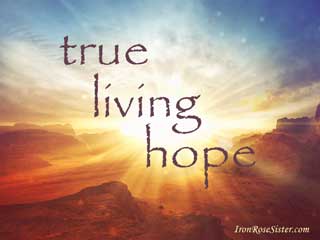 In His infinite love, God sent His Son to be born of a virgin. And while we celebrate Christ’s birth in December, it is His resurrection that transforms our hope into a living hope.
In His infinite love, God sent His Son to be born of a virgin. And while we celebrate Christ’s birth in December, it is His resurrection that transforms our hope into a living hope.
For if we are united with Him in His death, we will surely also be untied with Him in the resurrection (Romans 6:4).
Praise be to the God and Father of our Lord Jesus Christ! In his great mercy he has given us new birth into a living hope through the resurrection of Jesus Christ from the dead (1 Peter 1:3).
And since we are offered new birth into a living hope, we can live in hope.
What does it look like to live in hope—to have a living hope?
Dead hope weighs us down.
Living hope uplifts.
False hope distorts.
True hope inspires.
Dead hope frustrates.
Living hope encourages.
False hope discourages.
True hope transforms.
Thank you, Father, for true living hope! -
Twice-blessed Adoption
Written by Michelle J. Goff, Founder and Director of Iron Rose Sister Ministries
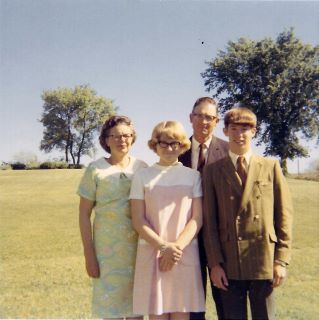
Tent Chapel Church of Christ in Blockton, Iowa, was a small church on the Iowa/Missouri border begun by Joshua Florea, father to ten children. His oldest daughter had a son, Glenn, who later had two boys, Charles and Dean. These brothers became neighboring farmers just north of the Florea-donated land for the Tent Chapel church building and cemetery. Joshua’s daughter, Maude, had a son named, Elvis, who later had a son named David, my dad.
Generations of the Florea family went to church together. Maude (aka Grandma Goff) was known for leading singing from the front row, proudly belting out the hymns to keep everyone in rhythm and on key. This rural farming community of family and neighbors gathered on Sunday mornings for worship, potlucks, and fellowship. They rejoiced when others rejoiced, and they mourned when others mourned.
Fast forward a few decades to 1966… Charles and Dean Cobb, both married by this time, were among those who learned of Elvis’ death and his wife Ruth’s resulting nervous breakdown. Dean and Evelyn, his wife, then watched Elvis and Ruth’s two children, my dad David and aunt Vickie, spend two years in an orphanage. Though they had never had children of their own, Evelyn had been a one-room schoolteacher. Dean knew that extra hands on the farm might be a help and mutual blessing. And so, in 1968, at the ages of 15 and 13 respectively, my dad and Aunt Vickie came to live with their distant cousin, Dean, and his wife of only ten years, Evelyn.
Growing up, my sisters and I were unaware of the full background of the story, and I am only sharing a snippet with you here... We would visit Grammy (dad’s birth mother, Ruth) and take her on day trips from the care facilities where she lived. We would spend a week every summer on the farm with Grandpa (Dean) and Grandma (Evelyn), exploring the barn, riding the four-wheeler, fishing in the pond, making cookies, and enjoying the fresh Iowa corn and other amazing cooking from Grandma’s kitchen.
I can still smell the mixture of tractor grease, dirt, and sweat from giving Grandpa a hug in his worn pair of overalls. Scrabble and baking with Grandma were annual traditions. Her recipe of Jell-o cookies became my own Christmas tradition.
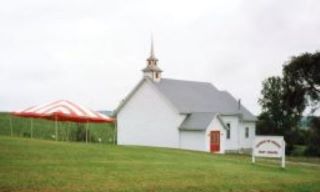
While no formal adoption took place, there was never any doubt in our minds that Grandpa and Grandma were family. Dad had been adopted into their family and therefore, we were automatically born into that extension of their love and support.
Grandpa and Grandma did not pass on their last name. But neither has my dad since he had four daughters. None of them are upset at that lack of named legacy because the more important inheritance is one of faith and love.
Our heritage is part of our identity, but it does not define us. You may or may not know the history of your roots. You may have more questions than pride. Your heritage may be filled with brokenness and destruction instead of loving care.
No matter our history or our heritage, we have been given the beautiful opportunity to join a family of faith, to be adopted by the best Father one could hope to have.
3 Praise be to the God and Father of our Lord Jesus Christ, who has blessed us in the heavenly realms with every spiritual blessing in Christ. 4 For he chose us in him before the creation of the world to be holy and blameless in his sight. In love 5 he predestined us for adoption to sonship through Jesus Christ, in accordance with his pleasure and will— 6 to the praise of his glorious grace, which he has freely given us in the One he loves.(Eph. 1:3-6)
Adoption is an inclusion in family rights and privileges, traditions, and legacies. I share Maude Goff’s boisterous singing and Evelyn Cobb’s love of teaching. I was born into a generational legacy of faith and the Florea history of church planters. But when my dad and aunt were left alone as orphans, no longer directly connected to this legacy and those who could model that faith and its traditions, they were adopted back into that family.
It's like they were bought back or brought back, redeemed. They were given the choice of accepting the offer of a new home and family, of being “adopted.” Which would you choose? It is up to each of us whether we carry on the heritage of living adopted.
My family has been intimately and directly touched by adoption. Twice. We give thanks to God for Grandpa and Grandma, but our greater and eternal thanks are to God for His adoption of us as His sons and daughters.
Have you accepted the gift of adoption and eternal inheritance?
-
Wait, hope, and expect
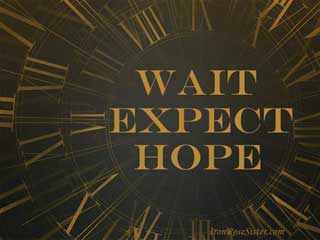 Waiting is no fun. But when I wait in expectation, filled with hope, the waiting is not in vain.
Waiting is no fun. But when I wait in expectation, filled with hope, the waiting is not in vain.
Yesterday, as we highlighted God’s big picture plan through the waiting, I was reminded of the various ways we can translate or understand the word “wait.”
In Spanish and in Hebrew, there is a verb that can be translated three ways into English—wait, hope, or expect.
While each of those three words has their own nuances or unique connotations, let’s think about how much greater our hope would be if we wait, hope, and expect in the Lord.
Micah 7:7 gives a good example of all three concepts in the same verse:
But as for me, I watch in hope for the Lord, I wait for God my Savior; my God will hear me.
If we watch in hope, we expect that his promises will be fulfilled. We wait, not knowing the time-frame, but expecting with hope.
What a blessing!
Now, let’s look at two more verses, inserting the three possible translations for new insight.
Those who wait, hope, and expect in the Lord will renew their strength. They will soar on wings like eagles; they will run and not grow weary, they will walk and not be faint. (Isaiah 40:31)
Be strong and take heart, all you who wait, hope, and expect in the Lord. (Psalm 31:24) -
Walk by faith, not by sight – literally

Last year, after returning from a trip to Buenos Aires, Argentina, and Bogota, Colombia, my vision was so blurred that I was became afraid that I was losing my sight completely.
The optometrist discovered a virus on my corneas. I was grateful to have “unveiled” the reason for my blurred vision, but in the days that followed the diagnosis, I wrestled with what that diagnosis implied for my physical body and my ability to work.
As the blurriness subsided, eye fatigue and eye strain continued to be factors, and seeing detail, especially to read, was nearly impossible.
Much of what I do in life and in ministry is dependent on eyesight. No matter how good a typist I claim to be, I need to be able to proof what I have written—whether for a blog post, a thank-you note, or the lessons I am working on.
There is much value in the Word that is written in my heart, but I was unable to read and study the Word as I would like, whether for a devotional thought or in preparation for the next book.
I wrestled with feelings of guilt and frustration—mostly because, yet again, I was focused on a dependence on my own abilities. I was quite literally reminded that I must walk by faith, not by sight.
In what ways are you depending on your own abilities—your “sight”—instead of walking by faith?
-
Walk by faith, not by sight – literally
 After returning from a trip to Buenos Aires, Argentina, and Bogota, Colombia, my vision was so blurred that I was became afraid that I was losing my sight completely.
After returning from a trip to Buenos Aires, Argentina, and Bogota, Colombia, my vision was so blurred that I was became afraid that I was losing my sight completely.
The optometrist discovered a virus on my corneas. I was grateful to have “unveiled” the reason for my blurred vision, but in the days that followed the diagnosis, I wrestled with what that diagnosis implied for my physical body and my ability to work.
-
Walking in Faith: An Adoption Story
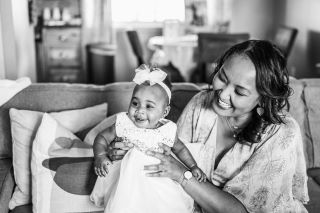 Written by Melissa Lindsey, volunteer with Iron Rose Sister Ministries in Colorado
Written by Melissa Lindsey, volunteer with Iron Rose Sister Ministries in ColoradoMy name is Melissa Lindsey and this is my journey to motherhood through adoption and more importantly, through faith. My husband and I have been married since 2014. Our marriage has been filled with adventures in traveling and has been met with its share of joy, challenges, and adversity. Our faith in God has served as a compass to guide us through times of uncertainty, unemployment, and infertility. In 2015, we became deeply interested in the idea of having a family of our own. Unfortunately, it was easier said than done.
From 2015-2017, we faced unemployment where Berdell had to re-invent himself and embark on a whole new career and I discovered I had stage 4 endometriosis and uterine fibroids. In 2016, I underwent surgery and had a myomectomy performed to remove my extremely large fibroids. By 2018, the fibroids returned with such aggressiveness that it was endangering my health and I was forced to have an emergency hysterectomy. Doctors were shocked I had been living with such an immense amount of pain for so long; they had never seen a case like mine before. The fibroids had attached themselves to my colon, bladder, and the endometriosis had completely destroyed my ovaries and fallopian tubes. Like any couple who dreamed of having children of their own, this was a devastating outcome that came with mourning and depression. To say I was not angry or not angry at God, would be a lie. As a former school counselor of 13 years, I have seen my fair share of children who go home to environments that are unstable: children who face different forms of abuse at the hands of the ones who are supposed to love and protect them. Yet here I was: childless, broken, and damaged. Did God find me unworthy? Too broken to bear a child in His image?
My husband was the one who brought up the idea of adoption. I was half invested in his suggestion; still hanging onto the hope that God would make a way and I would be pregnant. It was during this time I started a deep dive into social media and came across several stories from adoptees and adoptive parents who had situations similar to ours. This is where I found the adoption agency we would eventually use, Faithful Adoption Consultants. They are a Christian based organization located in Georgia. I loved their message and loved listening to the stories from families who adopted through them. We officially became active with FAC in January of 2020 and started receiving profiles of expectant mothers looking to place their unborn babies for adoption. I leaned on my husband, our faith, and scripture during this time; particularly Proverbs 3:5-6 NIV, “Trust the Lord with all your heart, and lean not on your own understanding; in all your ways submit to Him, and he will make your paths straight.” Our belief in the power of the Lord was definitely needed, because as soon as we signed on the dotted line that we wanted to be FAC clients, the requests for payment from every person who would play a part in bringing our baby home, started rolling in. There was no one else, but God, who could have made it possible to raise enough funds needed to adopt, down to the very last cent. Several times we questioned if we made the right decision; were we crazy? We’re just two educators with modest means embarking on one of our wildest adventures yet!
While we were incredibly blessed to have overwhelming support from family, friends, and even strangers. Our road to parenthood was not what we anticipated. While we thought we knew how we’d get to our destination, the reality is, the journey wasn’t what we expected. Our adoption experience didn’t come without some scars and struggles along the way. People unfamiliar with adoption do not understand the mere exhaustion of the process; the strain it imposes on your mind, body, and relationships. The number of hoops you have to jump through with different state agencies to determine if you’re fit to raise this beautiful child. Then there’s the waiting. Waiting to finally be chosen by an expectant mother. Praying each night this woman who’s making one of the hardest decisions of her life, will ultimately choose you to love her precious baby forever. Finally, there’s the one thing hopeful adoptive parents don’t like to talk about and are often too scared to bring it up – disrupted adoptions. Disrupted adoptions are often adoptions where a birth parent chooses to parent the child upon the child’s birth. My husband and I went through this experience twice.
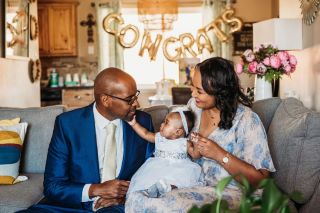 How do you grieve someone that never really belonged to you? These sweet babies that I loved for months will never know me. They will never know how hard I prayed for them and their mothers. Even though I never got to hold or feel these babies kick, they grew in our hearts and will forever be a part of our family. I went to a very dark place within myself during this loss. I struggled to process it all. Adoption is hard. Excruciatingly hard. Even though my heart felt like it had been ripped from my body, if a birth mother chooses to parent, that’s not a failure. While we mourned those losses, we fell deep into God’s Word, trusting the One who has the whole world in His hands. His love is steadfast. His promises are faithful. He brings redemption out of brokenness. “I consider that our present sufferings are not worth comparing with the glory that will be revealed in us” (Rom. 8:18). A week later, we received word a young expectant mom and her mother had chosen us to parent her baby after reading our profile. Despite our faith being severely tested, we always knew that God had a plan for us all along! Our greatest blessing was born September 30, 2020.
How do you grieve someone that never really belonged to you? These sweet babies that I loved for months will never know me. They will never know how hard I prayed for them and their mothers. Even though I never got to hold or feel these babies kick, they grew in our hearts and will forever be a part of our family. I went to a very dark place within myself during this loss. I struggled to process it all. Adoption is hard. Excruciatingly hard. Even though my heart felt like it had been ripped from my body, if a birth mother chooses to parent, that’s not a failure. While we mourned those losses, we fell deep into God’s Word, trusting the One who has the whole world in His hands. His love is steadfast. His promises are faithful. He brings redemption out of brokenness. “I consider that our present sufferings are not worth comparing with the glory that will be revealed in us” (Rom. 8:18). A week later, we received word a young expectant mom and her mother had chosen us to parent her baby after reading our profile. Despite our faith being severely tested, we always knew that God had a plan for us all along! Our greatest blessing was born September 30, 2020.It is evident that adoption is close to the heart of Christ and should be central to the mission of Christians worldwide. When we receive our Lord by faith, we have the honor of becoming His children. Throughout scripture, there are verses that tell of our spiritual adoption and how we are adopted into His family. “In love He predestined us to be adopted as his sons through Jesus Christ, in accordance with His pleasure and will…” (Eph. 1:5). We are all equals in the eyes of God. In adoption, every child is worthy of being part of a family, just as He has called us worthy to be His daughters forever. God wants this father-child relationship. He delights to provide for and protect His children. I can always rely on Him. There’s a verse I read every day during our period of waiting, Psalms 73:26, “My flesh and my heart may fail, but God is the strength of my heart and my portion forever.” God is my portion, He is enough. He was my portion when I was overwhelmed with worry and when we were going through hard situations. He was my portion before we adopted our baby girl and He continues to be what I need each and every day.
#IronRoseSister #HIStories #adoption #adopted #daughtersofGod #faith #guestwriter #blog
-
When God Asks Us to Trust and Obey
 Written by Amanda Vilela, volunteer with Iron Rose Sister Ministries in Sergipe, Brazil
Written by Amanda Vilela, volunteer with Iron Rose Sister Ministries in Sergipe, Brazil”Now faith is confidence in what we hope for and assurance about what we do not see” (Heb 11:1 NIV). The 11th chapter of the book of Hebrews begins with two attributes of faith: confidence and assurance.
It is faith itself, not our feelings about faith, that produces confidence. Some commentators offer various complex definitions of faith. But I believe that the best definition of faith is based on the certainty of confidence in the Word of God, and not on our circumstantial feelings.
The book of Hebrews mentions the traits of some people who walked by faith. Abraham is the first person described in the Old Testament as a specific example of faith and obedience and is called the “father of faith.” Submissive to God’s will, he journeyed to a land to which he had never been, being moved solely by the conviction that God’s promises would be fulfilled. By observing the cultural context of the book of Genesis where events in the story of Abraham and his wife Sarah are narrated, we see that the world in which Abraham lived was not at all attractive! The first signs of human decadence, such as idolatry, were present.
But looking at Hebrews 11, we observe the characteristics of confidence and obedience found in those who are known as “heroes of the faith” in God’s promises.
- Their faith came from something rational and not merely circumstantial or sentimental.
- Their faith was firmly founded on the promises of a God whose knowledge is unfathomable (Heb 11:9-10).
- They walked with God. Their faith grew as they knew God more.
- They believed in God’s comfort and providence in their lives (Heb 11:7).
- They left the pleasures of the world behind and looked toward the heavenly goal (Heb 11:24-27).
- Their faith was an act of courage (Heb 11:30).
- Their faith led them to act justly and to not fear men (Heb 11:32-34).
Above all, I believe that obedience is only present in genuine faith that must be seen in the transformation of every believer in Christ. Since my conversion, I have tried to discover the call of God for my life without understanding that I should read the Scriptures to find the answers, nor understanding that God’s will for our lives is that we believe in Christ and follow His way. Until I understood these things, I walked some painful and thorny paths in large areas of my life. I doubted God’s providence, and, in many issues, I tried to “do it my way” or rush the Lord’s plans.
When we do not trust in Christ, we tend to put ourselves as the lord of our lives. Symbolically, I identify with the curious process of the pearl’s formation in the oyster. Pearls are products of pain, the results of the entrance of a strange or undesirable substance into the oyster’s interior; an oyster that wasn’t hurt does not produce pearls. Sometimes, life’s adversities push us to trust in Christ, as if it were our last escape. I wanted everything to happen in my life in my timing!
I wanted to grow spiritually overnight and have the dream of a Christian family. I wanted God to heal my soul’s scars, but the truth is that I put little into practice, forgetting His promise, “Never will I leave you; never will I forsake you” (Heb 13:5). Those who seek to obey God must think like Abraham, Sarah, and Noah who considered their stay on this earth as brief, like foreigners awaiting return to their native land.
In the same way, we must think and live by faith, by hope, by the certainty of the fulfillment of God’s promises, not allowing ourselves to be shaped by the behavior of the world like people who have no hope but are attentive to our divine call to live in holiness. Listen to the call of Christ and pay attention to His voice as Samuel did when he said, “Speak, for your servant is listening” (1Sa 3:10). Calm the worries of this world and remember the words of Jesus: “Consider how the wild flowers grow…” (Lk 12:27-32). Look at the birds that rest in your window and remind you to trust in God. Just as the Lord cares for the little animals and dresses the wildflowers in the field, He will care for His people and will make them rest in green pastures, even amid life’s adversities.
May the Lord Jesus increase our faith, be it in joy or sadness, in victory or defeat. Even when fear and anxiety surround us, may our confidence and obedience grow as we walk as pilgrims and foreigners in this world, headed to the celestial city.
-
When God gives us hope and a future
 The Israelites were a rebellious nation. They served other gods and followed a path of adulterous unfaithfulness.
The Israelites were a rebellious nation. They served other gods and followed a path of adulterous unfaithfulness.
In the book of Jeremiah, God speaks to His people through the prophet Jeremiah to remind them that He has not forgotten them. And in chapter 29, Jeremiah pens a letter to the people who had been taken in exile to Babylon. In the midst of this historical context, we see God’s often-quoted promise to give us hope and a future.
“For I know the plans I have for you,” declares the Lord, “plans to prosper you and not to harm you, plans to give you hope and a future.” (Jeremiah 29:11)
While the time in Babylonian captivity was partially designed as discipline for Israel’s infidelity, it also served as an opportunity to share with other nations more directly about who God was and invite them into relationship with Him, the sovereign Lord.
Remember Daniel and his friends? What a testimony they gave to the Babylonian and Medo-Persian nations. God has plans to give us hope and a future. It just may not look like we would want it to at the time.
Ultimately, God is in control. Whether the things that happen in our lives are a consequence of our actions, a form of disciple, the product of our decisions, or the design of God, the most important thing to remember is that God has a plan—a plan to give us hope and a future.
God’s plan is divine, infinite, supreme, and the ultimate source of hope for a redeemed future. -
Why is love the greatest?
 1 Corinthians 13:13 says that the greatest of these is love.
1 Corinthians 13:13 says that the greatest of these is love.
Buy why is love the greatest? Here are a few answers from Scripture.
Love prompted God to send His Son (John 3:16).
Love is the foundation of our priorities (Matt. 22:34-40).
Love sums up the Law and the Prophets (Matt. 22:40).
Love conquers fear (1 John 4:18).
Love forms an unbreakable bond with God (Romans 8:35-39).
Love covers over a multitude of sins (1 Peter 4:8).
Love inspires obedience (John 14:15-24, 15:10).
Love works things together for good, reminding us that God is in control (Romans 8:28).
Love takes wise action with others (Romans 12:9-21).
Love makes things worthwhile (1 Corinthians 13:1-3).
Love is patient, love is kind. It does not envy, it does not boast, it is not proud. It does not dishonor others, it is not self-seeking, it is not easily angered, it keeps no record of wrongs. Love does not delight in evil but rejoices with the truth. It always protects, always trusts, always hopes, always perseveres. Love never fails. (1 Corinthians 13:4-8)
Do you know anything else that can do all that?
Only God, himself. But since God is love (1 John 4:8), that must be part of why love is the greatest.
Page 4 of 4

